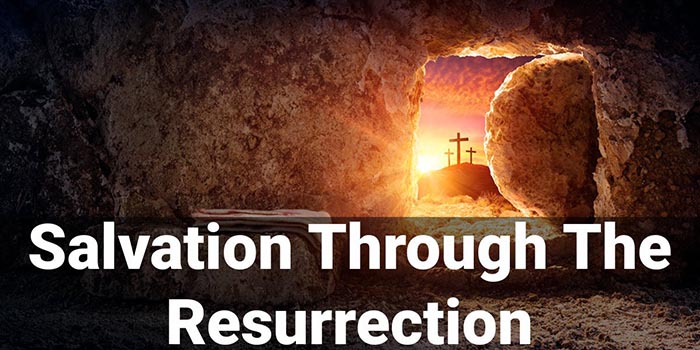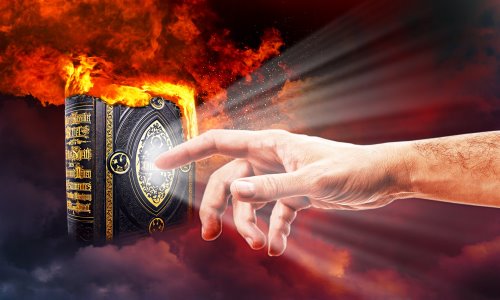
Ephesians 1:14
Which is the earnest of our inheritance until the redemption
of the purchased possession, unto the praise of his glory.
Both these terms are generally misunderstood because of the traditions of men. And these sayings of men are more or less founded on the lie of Genesis 3:4; "Ye shall not surely die." And from this came the doctrine of the immortality of the soul. So then, resurrection is not really needed, and salvation has come to mean avoiding the punishments and tortures in hell for sins.
The immortal soul is a term foreign to the Scriptures. And hell is simply the grave in which there is no knowledge or device, for the dead know not anything. So in light of these things, many have to revise their ideas of resurrection and salvation.
In the first place, these two are inseparable, for salvation always includes the resurrection. That is why we find in 1 Corinthians 15:12-18 the fact that salvation without resurrection leaves men in a miserable state and faith is vain.
In John 3:16, the alternatives are perishing or having everlasting life. Those who believe are given everlasting life and will be raised on the last day (John 6:40, John 6:54).
In Ephesians 1:14, resurrection is spoken of as the redemption of the purchased possession, i.e., resurrection. Likewise, in Eph. 4:30, the believer is sealed unto the day of redemption, i.e., the day of resurrection. Those who have believed, as in Eph. 2:8-10, have then the certainty of resurrection to life. Since resurrection is a part of salvation, and that is for the believer, then the unbeliever can have no part in it except judgment.
Those who profess to believe that there is a universal salvation for all men then must also believe in a universal resurrection to life. But this can not be found in the Scriptures.
In the past dispensation, we find in Romans 13:11, "For now, is our salvation nearer than when we believed." Salvation here covers quite a bit. It is the Lord, His coming, the raising of the dead, and the change of the believers that are alive at His coming. This is their salvation.
So Christ was once offered to bear the sins of many; and unto them that look for Him shall He appear the second time without sin, unto salvation (Hebrews 9:28). Again, the second coming and resurrection are the salvation the Hebrews were to look for.
So we have to conclude that salvation includes the resurrection. Even those who are not overcomers will be raised. All that have the gift of life, both just and unjust, are in this group. God may have only a remnant in each age, but all these will be resurrected and accomplish God's purpose in them. Satan will have none after death, and hell will cease to exist. And he himself will also perish and be no more (Ezekiel 28:19).
The average Christian today would say to God, "Do not bother about a resurrection, for when I die, I will come to You."
You will find little in theological writings to help with the subject of resurrection. All we can find about The Truth of it is from The Word of Truth, not from the writings of men.
In Mark 9:9, after the transfiguration, the Lord told the disciples not to tell what things they had seen till The Son of Man was risen from the dead. And they pondered these words, for they did not understand them. They knew of a resurrection, even as Mary and Martha did, a resurrection on the last day. But when you examine the words of the Lord to the disciples, He had said, "From among the dead ones."
He is not referring to the general resurrection of Israel on the last day which they knew about. Of all the dead people yet today that are in their graves, known in Scripture as hell, in the grave, in the sepulchers, and any other names you can give, He is the only One Who has had a Resurrection. He is the only One Who has overcome the gates of hell. The rest of the dead are still dead. Out of all who have died, He is the only One living.
Now it is curious and worthy of note that when the Bible speaks of those who believe and are His, they also will be raised from among the dead ones. The AV (Authorized Version) is not so plain on this, but consult the RV (Revised Version) and see if it is not consistent in this matter. Resurrection is the only thing that can end death that surely comes upon the children of Adam.
Just note in Daniel 12:2 that in speaking of some of Israel on the day after the tribulation, there will be a great crowd of dead ones. Some of them that are sleeping when Michael stands up will be awakened to life. Notice sleep is used as a figure of death but only in the case of believers, both in OT and NT. Among those who expect to wake is David. See Psalm 17:15, "As for me, I will behold Thy face in righteousness: I shall be satisfied, when I awake, with Thy likeness."
Job has a similar testimony in Job 14:15, "Thou shalt call, and I will answer Thee." Read the whole context, for he had prayed that God would hide him in hell in verse 13.
So if Christians are not resurrected, then our faith is vain, and we, of all men, are most miserable. So for believers, everlasting life; for unbelievers, judgment and then perish.
The essence of salvation is resurrection, for without it, death would never be destroyed, and men would stay dead forever. The believers are raised incorruptible, immortal (1 Corinthians 15:52-53).
To understand resurrection, we must also understand, Begetting. There can be no birth or new life without first a begetting. And this the Word of God affirms. "God...begat us again unto a living hope by the resurrection of Jesus Christ from the dead (1 Peter 1:3 ASV)." "Being born again, not of corruptible seed, but of incorruptible, through the Word of God, which liveth and abideth for ever (1 Peter 1:23)." These are the only occurrences of anagennao. However, gennao can be translated as either born or begotten and, in some instances, translated both ways in one verse. So the context rules the correct translation.
Born Again. We get a hint of what this means when we find that Christ is the Firstborn from the dead (Colossians 1:18). Now we know what the Lord meant when He told Nicodemus about being "Born Again." It was that neither he nor the nation could see or enter into The Kingdom until Resurrection. Nicodemus was already a believer and confessed it before the Lord, so he already had his begetting, and the Lord tells him that the time of The Kingdom and their entering into it would be The Resurrection.
Believe or Perish. There are two alternatives in John 3:16. that whosoever believeth in Him should not perish. There is no third way here. No room for reincarnation in the flesh, but it means either a resurrection to everlasting life or a resurrection to judgment. There are only two classes of people on the earth today; those that are perishing and those that have already been given the gift of life through faith in The Savior. Now don't misunderstand us, Christ Jesus is The Judge, and some, because of the thoughts and intents of their hearts and our God's Perfect Foreknowledge, will be granted life, but that is a study for another time.
Adam was the Head of the Human Race, and because Adam fell, all his descendants must die. Christ is The New Head of the Human Race, and because of His Faithfulness, all mankind will be made alive. This has been a controversial part of The Word because so few consider the words. . . "For as in Adam all die, even so in Christ shall all be made alive (1 Corinthians 15:22)."
In the Dispensation of Promise, there is a change promised for the believers who are alive at the coming of the Lord. It has been asked if this change was a part of the secret or mystery preached by Paul. It most certainly is not. Job knew about it (Job 14:14). The Lord told Martha about it (John 11:26), for He said that those living when He came would never die. So this change is not a part of The Mystery.
Is there any life or hope outside of resurrection? Satan says that there is, and so he has said that man does not really die (Genesis 3:4). But nowhere in The Word do we find any life outside of Christ. In Him is life.
There are many who are asleep in Christ. What would happen to them if the Sadducees were right and there is no resurrection? That would mean that they have perished. That is the answer you will find in 1 Corinthians 15:18. This is closely related to John 3:16, where ultimately, the alternatives are life or perishing.
Can any person ever lose his position in heaven? This is a hard question. If this should mean The Heavenly Places or Heaven of the heavens, then the answer would be negative. But if it means the heavens above in this Cosmos, then we will have to qualify a little. At the gathering of saved Israel and those associated with them, they will be taken up into the air or heaven, and they will return with the Lord to the earth where He will rule. There is a being there who will be cast out someday with a great multitude of angels with him. That is Satan. You can read about this in Revelation 12:3-4; Rev. 12:7-13.
Where is Christ at the present time? He is in The Holy of holies, in Heavenly Places, Far above all. Can He be seen there? Are there any beings around Him enjoying His presence? No. He is hidden there at the present time, waiting for the day of MAnifestation when His Church which is His Body, will be Manifested with Him. "When Christ, who is our life, shall appear, then shall ye also appear with Him in Glory (Colossians 3:4)." In the fullness of times, He will take over His power and authority, first in the heavenlies and then He will come to the earth as King of kings and Lord of lords. It is likely that there will be about 31/2 years between these events.
How is Resurrection possible? Through The Work and Sacrifice of our Savior. How can such a thing be? It is part of God's redemptive plan. We must all understand, First, if there were no Resurrection, then all life of human beings would cease at death. But God had a plan and purpose for the ages, and so Resurrection was planned. It is the most expensive purchase God will ever make, for it cost Him the precious blood of His Son, Who paid the penalty of death to redeem mankind from the wages of his sin, death (Ephesians 1:7; Romans 6:23).
Most error concerning the Scriptures comes from inaccurate reading. Either too much is read into a passage and then right out again, or the passage is not made to mean all that it should mean. In the matter of resurrection and judgment, this has been a great source of confusion.
Matthew 25:31-46 speaks of a judgment of the nations that are alive and on the earth when The Judge comes. This is at the beginning of The Millennial Kingdom. There is no resurrection mentioned here.
Paul speaks of the same judgment in Acts 17:31 at Mars Hill in Athens. He spoke of it because he was preaching The Kingdom and the coming King, Who also was to be The Judge of the world. According to the prophecy in Daniel 9:24-27, there were 70 weeks for the people and the holy city. This would have ended in A.D. 85. But Acts 28:28 intervened, A.D. 85 came and went with nothing happening.
Right Division is needed in Revelation 11:18. The time was at hand for certain things to happen. The nations would be angry because of the plagues which precede the wrath which is poured out, not upon the dead, but upon the living and especially the throne of the beast. Then comes the time of the dead (the gathering) and their judgment according to their works. This is not the time of unbelieving dead being judged for their works. Wrath and judgment are for the nations. Note in this verse that reward is for dead servants, prophets, and saints. The same verse ends with the promise of destroying those that destroy the earth.
In 2 Peter 2:9, we have a reference to reserving the unjust unto the day of judgment. They are to be punished. It is certain these are unbelievers and their resurrection in view. Those that are being reserved have been dead for many centuries. But that day is not yet but will still come to pass.
Note that in John 5, there are two accounts of The Resurrection. John 5:24-25 speaks of the believings that heard the voice of The Son of God and Him Who sent Him, and those that believed in Him will be resurrected. In John 5:28-29 those that are in the sepulchers (remembrance places) shall hear and shall come forth, and these are the rest of mankind. All men, just and unjust, good and bad, small and great, will be resurrected. But each in his own rank or order. God will rightly divide them by the thoughts and intents of their hearts.
We note in The Scriptures that there is an obvious analogy between the physical and spiritual things. And this is true of life. There is a physical life, and there is a spiritual life.
In these days of murder and violence, there is the constant question of when physical life begins. Maybe we can find the answer from the Word by making use of this analogy.
For God so loved the world, that He gave His only begotten Son, that whosoever believeth in Him should not perish, but have everlasting life (John 3:16). We are to understand that this everlasting life begins upon God's loving and people believing.
Blessed be the God and Father of our Lord Jesus Christ, Which according to His abundant mercy begat us again unto a living hope by the resurrection of Jesus Christ from the dead (1 Peter 1:3, see margins). Here is a double living. A begetting, or the start of life, and this unto a living hope. In this case, it is the hope of Israel. Life begins at the begetting.
Being begotten again, not of corruptible seed, but of incorruptible, by the Word of God, which liveth and abideth for ever (1 Peter 1:23, see margin). Note that this seed, the Word of God, is said to be incorruptible. It is living and lasts forever. Those who have been so begotten are partakers of the divine nature, having escaped the corruption that is in the world through lust (2 Peter 1:4). Note the emphasis on the fact that The Seed, The Word, is incorruptible. Hence there can be no hindrance of any kind to prevent the birth that is sure to follow.
See note in Companion Bible on John 3:8 and see if this is a true paraphrase of that verse; The Spirit breatheth where He willeth, and thou hearest the voice thereof, but canst not tell whence it cometh, and whither it goeth: so is (the experience of) everyone that is begotten of the Spirit. All people who are Spirit born have a new life, a new nature, the new man, the Spirit of Christ, the Spirit of God, and other names used in the Scriptures for such a condition. Life begins with the begetting, with conception in the physical realm. If not, then the Bible is wrong in these parallels.
And, just as the physical begetting results in a birth, so does the spiritual. So we have the explanation of being born again. It is a resurrection from the dead. Nicodemus was to understand that he could not see or enter into The Kingdom without Resurrection.
"Thou art My Son; this day have I begotten Thee (Psalm 2:7)." This means brought to a full birth. See Acts 13:33; Romans 1:3-4; Colossians 1:18; Revelation 1:5.
In Acts 13, it is used to prove The Resurrection. It is Christ's Resurrection in Romans 1. Colossians 1:15-19 emphasizes that Christ is the "firstborn from the dead." The same is true of Revelation 1:5.
Spiritual life begins upon believing and ensures a resurrection. Therefore resurrection is immortality and incorruptibility. 1 Corinthians 15:42.
Salvation and resurrection belong together!




























